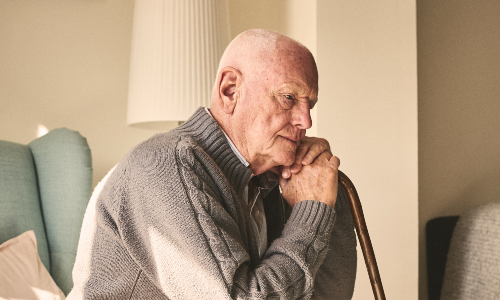For older people and the medical practitioners who care for them, healthcare often focuses on physical wellbeing – from managing long-term conditions to treating short-term aches and pains.
While this is understandable, it can mean that older people’s mental health is frequently overlooked. Mental health issues are left undiagnosed, untreated, and dismissed as a natural part of ageing, and too often, older people’s mental wellbeing takes a back seat.
Risks to wellbeing
The intrinsic link between physical health and mental health is important. For people who are managing multiple physical health conditions or who have a disability, living with pain every day or no longer being able to do favourite activities can significantly affect mental wellbeing. But for many older people who feel physically well, significant changes in their lives can have the biggest impact on mental health – including bereavement, retirement, changing friendships, and family moving away.
Events of the past few years – from the COVID-19 pandemic to the cost of living crisis – have also been particularly challenging for older people, and recent research indicates that this has had a detrimental impact on older people’s mental wellbeing. For instance, Age UK research from 2022 revealed that a third of older adults were feeling more anxious than before the pandemic.
Despite this, we know that a stigma surrounding mental health often persists for older people, and many have internalised some of those incorrect but long-standing beliefs that depression and anxiety are an inevitable part of later life. As a result, older people and their families often don’t recognise that they may need support, and can be reluctant to ask for help when it’s needed.
The importance of talking therapies
We can see some of these trends at work in the low number of older people accessing mental health support like NHS Talking Therapies. For many older people, the term ‘mental health’ holds associations with more severe mental health conditions, and excessive worry, stress, fear, and sadness are not necessarily seen as feelings that you can and should get help for. But it’s actually in addressing very common feelings where NHS Talking Therapies can be most effective, as highlighted in our recently updated NHS Talking Therapies Positive Practice Guide.
Martin's story
Martin found it difficult to speak about his mental health before he started talking therapy.
Talking therapies can be delivered online, over the phone or in person, and can involve counselling, Cognitive Behavioural Therapy or guided self-help. Regardless of which therapy is considered most appropriate for the individual, talking is often the best way to start feeling better.
The therapies are proven to work – and they’ve been shown to work particularly well for older people, with those aged 65-74 having an overall recovery rate of 61% following treatment compared to 51% of adults aged 26-64. Despite this, older people made up just 5.6% of national referrals to NHS Talking Therapies in 2021-22, varying from 2.2% to 9.6% depending on the area. With older people making up 20% of our population, this referral rate clearly needs to change.
How to help
Older people who are struggling with feelings of depression or anxiety need to know how to seek help as soon as possible. That’s why we’re raising awareness of the support available – including self-referral to NHS Talking Therapies – and encouraging healthcare professionals to do the same.
Throughout March, we will be focusing on older people's mental health. As well as the updated NHS Talking Therapies Positive Practice Guide, we’ll be releasing a new resource for older people on anxiety and depression, highlighting resources that can be shared with the older people you work with, and publishing a new report which dives into where we are now with older people’s mental health.
What you can do
- Read and share our updated NHS Talking Therapies Positive Practice Guide
- Share resources from our mental health hub with other practitioners and mental health leads
- Raise awareness of NHS Talking Therapies and highlight that people can self-refer
- Ask the older people in your life or work about their mental health
Information you can trust
Our monthly professionals newsletter covers a range of information and advice topics, helping professionals offer older people the most relevant and up-to-date guidance.






